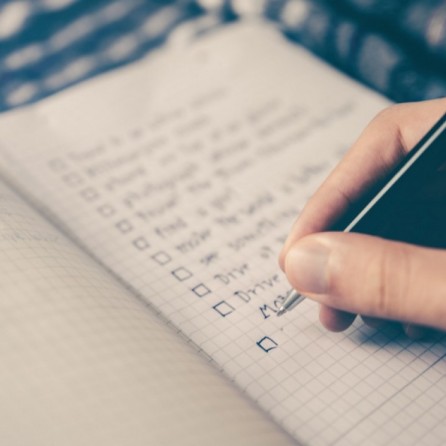
OMSer Nicole Zobrist shares how she is actively incorporating meditation into her daily life, and what her meditation goals are.
What a difference a year can make. Around this same time last year I was writing my first blog for OMS and through that, I was letting people beyond my closest family and friends know about my MS diagnosis (I was initially diagnosed in April 2020). Shortly after I also experienced a relapse, began seeing a new neurologist, started on new medication, and embarked down a new career path. So, a lot has happened over the past 12 months — and while some events were certainly better than others, it has been largely positive. Or maybe it’s more accurate to say that what started as a negative event — my relapse — turned into something positive.
My relapse happened to begin during a very stressful time at work. This encouraged me to pursue tools to help me re-evaluate and manage stress. At this point in my life with MS, I had already embraced diet, exercise, medication, and vitamin D, but I was still struggling with the meditation part of the OMS Program. It isn’t that I didn’t believe in it, I’d done mediation sparingly enough to know it would be hugely beneficial, it was just that I struggled to make the time. And yet I knew that if I wanted to fully embrace all that OMS could offer me and truly “change my life, for life” I would need to make time for meditation, mindfulness, and overall stress management.
In other areas of my life, I’ve learned that successfully building habits comes easier when I don’t have to rely on willpower alone. If I want to avoid foods high in saturated fats, I don’t keep them in the house. Or if I want to make sure I’m exercising more, I schedule workout classes ahead of time. When it comes to meditation, there isn’t a traditional class I can attend, and so I have felt that I do have to rely more on willpower. But I still have the ability to schedule 30 minutes of meditation into my day, and what I have learned is that guided meditation works best for me.
So now, I aim for 20 minutes of meditation each day. This feels less daunting than 30 minutes, although I’d like to work up to that in the near future. But to be quite honest, I’d be okay with 5 minutes to start…still, I try to focus on the importance of “showing up” and creating a foundation to build upon. I’ve also found it helpful to schedule my 20 minutes of meditation in the morning, after my workout, but before I start my working day. However, I’m less stringent here — sometimes a midday meditation or even an afternoon meditation is a great way to re-centre and reset.
Beyond building a regular meditation practice, I’ve tried to become more mindful when it comes to the stress in my life and how I respond to it. Not all stress is avoidable, and stress doesn’t have to be negative. However, there are situations in which I need to allow myself to walk away. I’ve found that the more mindful I am with my emotions and the stressful factors in my life, the more control I have in how I respond. That’s not to say stress doesn’t get the best of me on occasion, but it doesn’t happen nearly as often as it has in the past.
I’ve kept a journal for years, long before I was diagnosed with MS, and I’ve found this is another great tool in developing a level of mindfulness and awareness. It’s been a great space to process my emotions, thoughts, stresses, and so much more. Journaling has helped me to put words to my emotions, much like meditation can help to define the emotional state.
It’s been encouraging to feel an increased level of mindfulness when I meditate more consistently. The more consistent my meditation practice, the more control I have over how I respond to situations — so my default isn’t always to become stressed out. This means I am more likely to notice all that I have to be grateful for. I’ll be the first to admit that I still have a lot of progress to make on the meditation and mindfulness front but it’s helpful to remind myself that it’s called a “meditation practice” for a reason. We aren’t supposed to be experts right away — or possibly ever.
By Nicole Zobrist